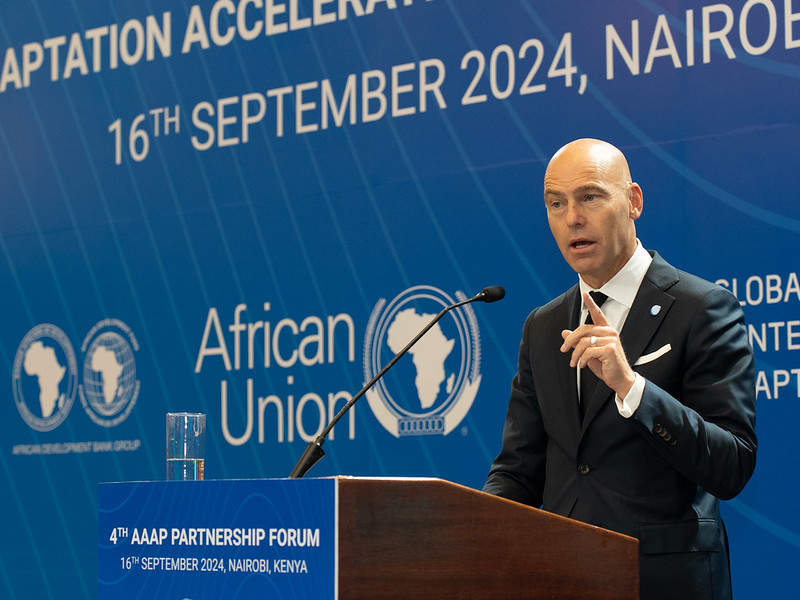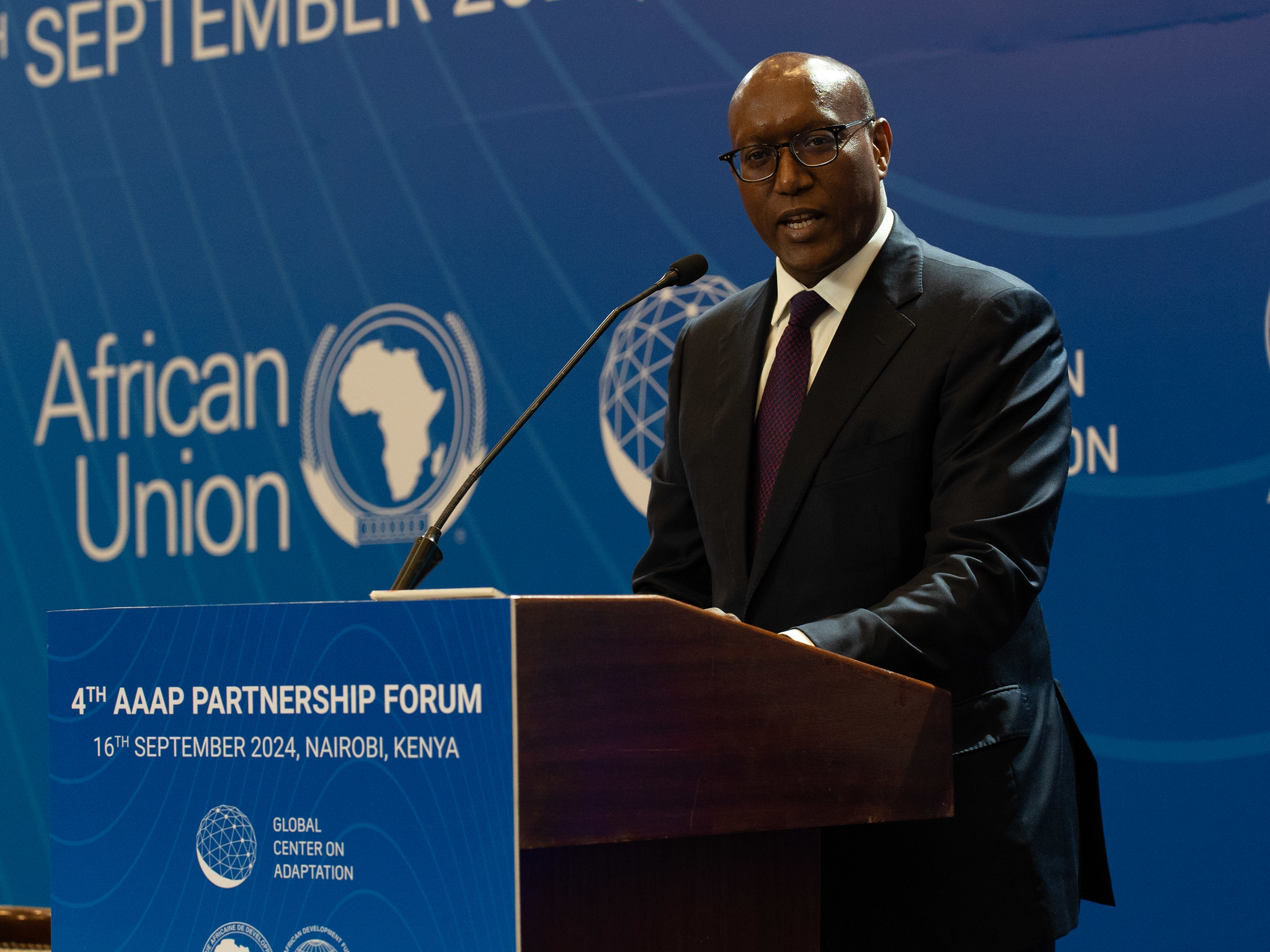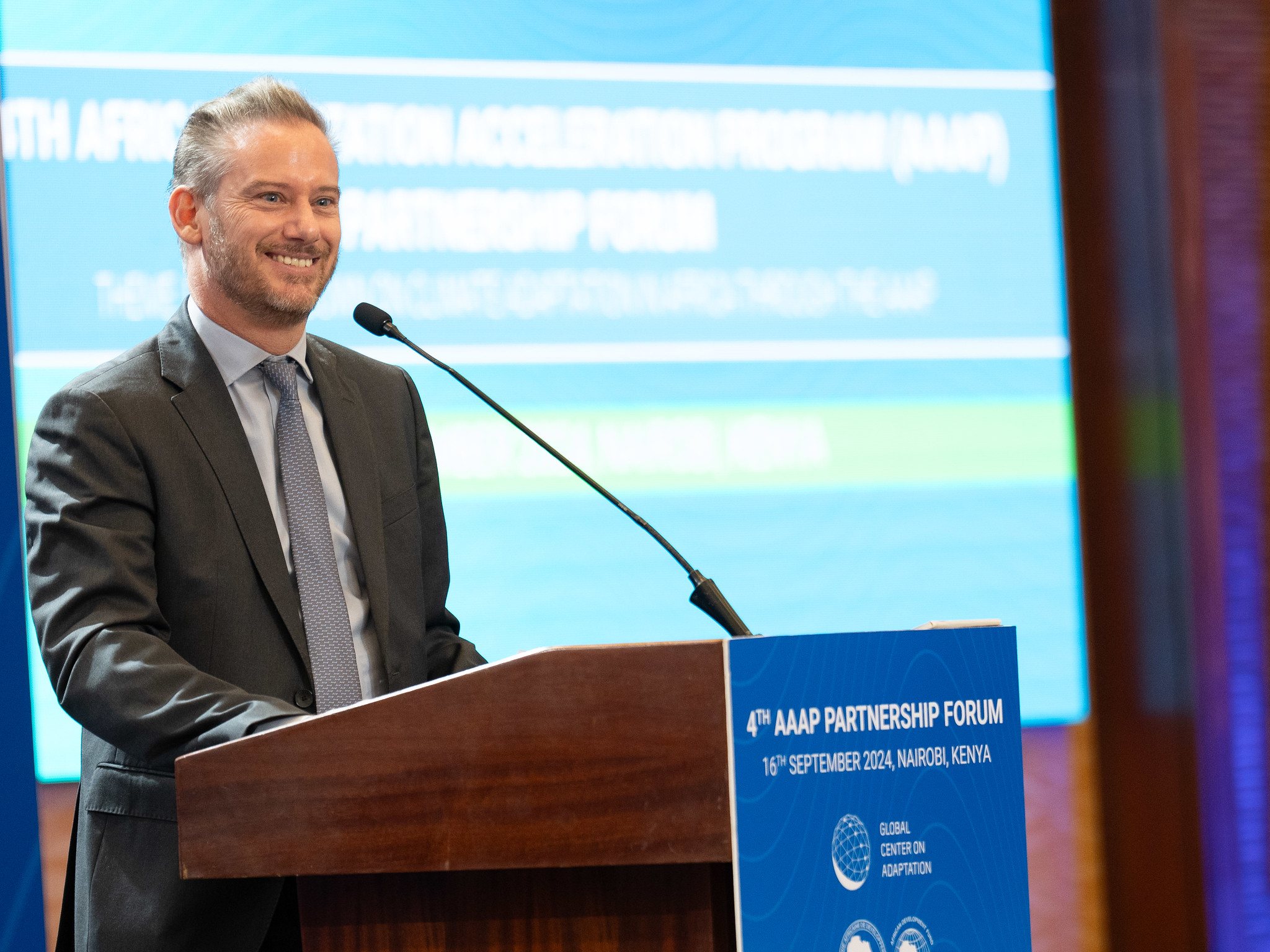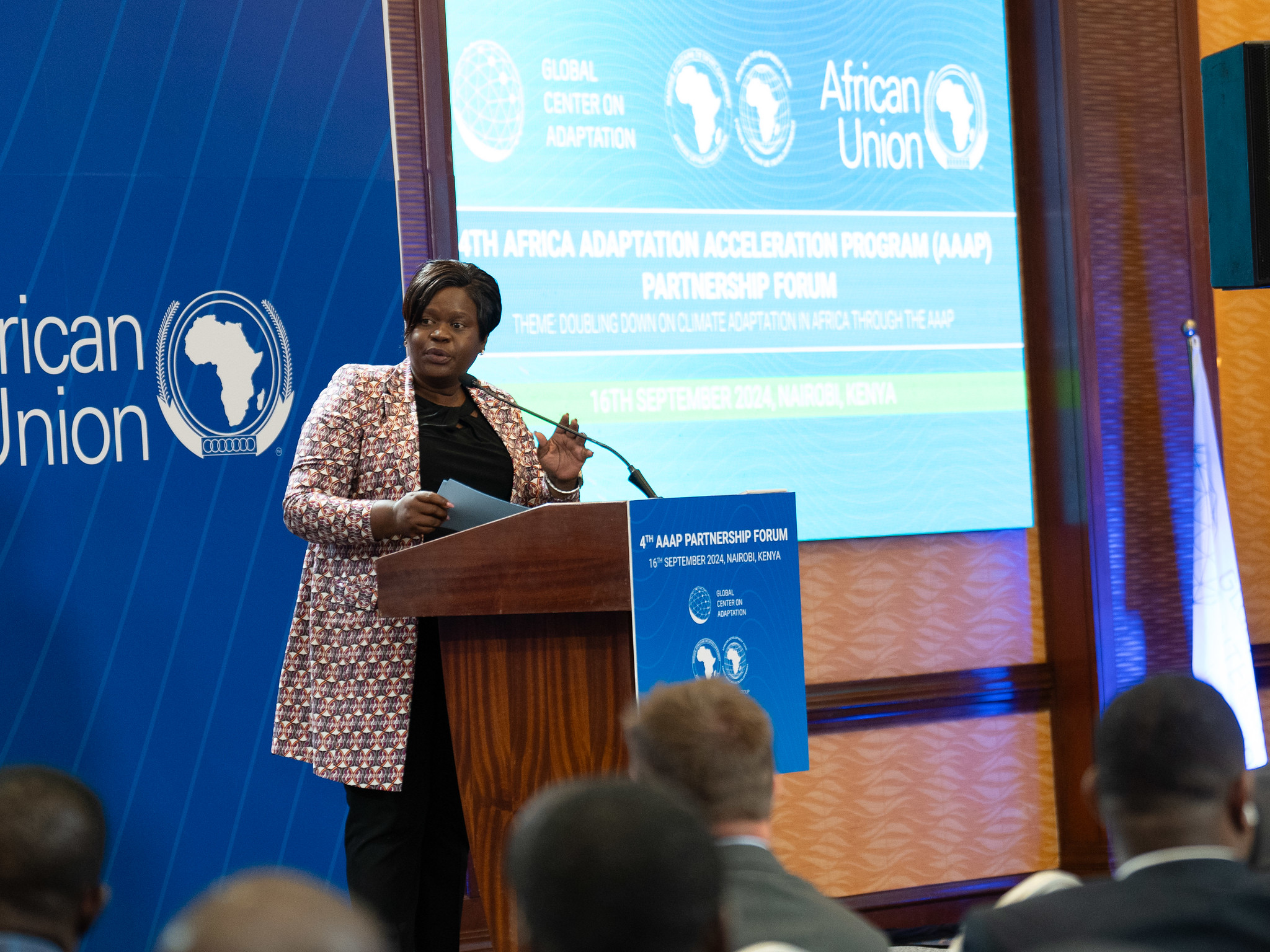Africa Partners Delivering Adaptation Results: $10 Billion of Development Investments Made Climate Resilient
4th AAAP Partnership Forum brought partners from across Africa and globally to Nairobi to double down on climate adaptation action for the most vulnerable
N
airobi, Kenya, 16th September 2024 — Highlighting the results of the first 36 months of the world’s largest climate adaptation program, the Africa Adaptation Acceleration Program (AAAP), ministers, experts and practitioners in and outside of Africa, gathered for the program’s 4th Partnership Forum in Nairobi, Kenya. AAAP so far mainstreamed climate adaptation into over $10 billion of development investments in Africa from various international financial institutions (IFIs), benefiting over 63 million people across 37 African countries.
Organized by the Global Center on Adaptation (GCA) in collaboration with the African Development Bank (AfDB), the Forum showcased the remarkable progress of AAAP to date. Since its launch by African leaders in 2021, becoming operational in 2022, the AAAP has also been instrumental in creating close to 1 million jobs in sectors such as agriculture and renewable energy. The work of GCA under the AAAP is supported by the Gates Foundation, Denmark, Germany, France, the Netherlands, Norway, and the UK.
In his keynote address, Professor Patrick V. Verkooijen, CEO of the Global Center on Adaptation, underscored the urgent need to accelerate climate adaptation efforts on the continent. “Africa is at a cross-roads, staring down the barrel of an out-of-control climate crisis for the world’s most vulnerable continent.” He added that the AAAP has come as a practical solution as Africa’s ‘Adaptation Transmission Belt’: “Because of this Transmission Belt, 16 million farmers, 60 million people and almost 1 million jobs are increasing resilience to climate shocks. And we have only just begun our work. As we keep scaling up, we have our eyes on the $25 billion target of investments shaped by the end of next year.”
Looking ahead, Professor Verkooijen affirmed the GCA’s commitment to continue to enhance its collaboration with CGIAR, the global partnership for research on food security, to further scale climate adaptation innovations and technologies. Tapping into the unused potential for private climate finance in Africa will represent an additional area of renewed focus.

Professor Patrick V. Verkooijen, CEO of the Global Center on Adaptation
Aden Bare Duale, Cabinet Secretary, Ministry of Environment, Climate Change and Forestry, Republic of Kenya, expressed Kenya’s strong commitment to the AAAP and its goals. “By focusing on the key pillars of African economies (climate-smart agriculture, resilient infrastructure, nature-based solutions and climate adaptation jobs) the Africa Adaptation Acceleration Program embodies the spirit of African leadership, innovation and partnership in addressing the climate crisis head on. I wish to acknowledge and appreciate that Kenya has been a direct beneficiary of GCA’s investment to the AAAP. GCA has committed over 3 million euros to programs of the African Development Bank, World Bank, IFAD, related to food security, infrastructure and nature-based solutions and adaptation jobs in Kenya” He added that “Looking ahead, Kenya remains fully committed to the AAAP.”
Anne Beathe Tvinnereim, Minister for Development of Norway, shared a virtual goodwill message: “Norway is pleased to continue our support for the AAAP through our cooperation with the Global Center on Adaptation. African countries can achieve higher national self-sufficiency by building more climate robust, small scale food production. To achieve that, we need continued political priority for food security. Investing in local value chains and markets will create new jobs, strengthen economic growth, and significantly reduce world hunger.”
African Development Bank Vice-President for Power, Energy, Climate and Green Growth, Dr. Kevin Kariuki, further highlighted the achievements of the Program: “Through AAAP, adaptation measures have been integrated into 68 African Development Bank projects and technical assistance support, spanning 41 countries in critical sectors such as agriculture, water supply, sanitation, transport, and urban development. The profound impact of these efforts is already visible. In Agriculture, through 17 of the 68 projects, AAAP has significantly enhanced food security and climate resilience, particularly for vulnerable communities, ensuring that 9.4 million people across 16 countries, particularly in the Sahel, Horn of Africa, and the Zambezi Basin, are better equipped to face climate risks. These projects demonstrate that by targeting high-impact sectors and populations, adaptation finance is driving transformational change on the ground, helping Africa build a future where climate resilience and sustainable development go hand in hand.”

Dr. Kevin Kariuki, African Development Bank Vice-President for Power, Energy, Climate and Green Growth
Arnaud Suquet, Ambassador for France to Kenya, also shared his country’s commitments: “Globally, we are partners of GCA and we’ll continue to be a partner. It’s not a one-off,” adding that “There are a lot of priorities worldwide, but I think adaptation to climate change is in the interest of everybody.”

Arnaud Suquet, Ambassador for France to Kenya
Gladys Atieno Wanga, Governor of Homa Bay County, provided a message from the frontlines, illustrating how the AAAP can provide locally anchored support to communities: “When the Global Center on Adaptation came knocking with an offer to partner with the AAAP, I was only too happy to agree.” She added that “together under this partnership, we support vulnerable communities in Homa Bay, starting with those in informal settlements, to create People’s Adaptation Plans. The plans will map and profile how climate change is impacting those vulnerable communities, particularly in the water and sanitation sector. This approach comes through the guidance of the GCA’s Global Hub on Locally-Led Adaptation, a fantastic center of excellence and knowledge on locally-led adaptation practices.”

Gladys Atieno Wanga, Governor of Homa Bay County
During the Forum, awards were presented to the founders of three Kenyan start-ups – FLIPS Org, RoISUM by Houtech Company Limited, and Apen Softwares – selected for the Climate Resilience and Adaptation Accelerator Program, funded by the Global Center on Adaptation (GCA) and implemented by the University of Nairobi’s C4DLab. Each start-up received a grant of €42,000 to develop digital solutions that address physical climate risks and enhance resilience in low-income and vulnerable communities. These start-ups exemplify the AAAP’s commitment to fostering local innovation and integrating climate resilience into national development strategies across Africa.
The 4th AAAP Partnership Forum also celebrated the achievements of youth from Mukuru, Nairobi, who successfully completed training on the innovative Black Soldier Fly farming model. With support from GCA (for 10 units), DanChurchAid (1 unit) and the African Development Bank (1 unit) these young entrepreneurs were trained to operate 12 Black Soldier Fly Units. This climate-smart initiative promotes sustainable waste management by using Black Soldier Flies to process organic waste, reducing landfill pressure, and mitigating flash flooding by preventing waste blockages in drainage systems. During the forum, GCA CEO, Professor Patrick V. Verkooijen, presented graduation certificates to the young participants, acknowledging their contributions to climate adaptation, resilient agriculture, and urban flood prevention.
The Partnership Forum was attended by over 250 participants, bringing together a coalition of over 50 partners including leaders, experts, and stakeholders committed to scaling up climate adaptation efforts across the African continent that represented a range of organizations: government, private sector, civil society and academia. The Program also featured focused discussions around resilient infrastructure, the food-water-gender nexus, and financial mobilization for adaptation. Panelists and participants provided insights into AAAP achievements and suggestions for further Program development.
As Africa looks ahead to the 29th UN Global Climate Summit (COP29), the outcomes of the AAAP’s 4th Partnership Forum are pivotal in shaping the continent’s climate adaptation delivery efforts.
Notes to Editors
About the Africa Adaptation Acceleration Program (AAAP)
The Africa Adaptation Acceleration Program (AAAP) is a joint initiative by the African Development Bank and the Global Center on Adaptation, aimed at mobilizing $25 billion over five years to scale up climate adaptation in Africa. Since its launch, the AAAP has integrated climate adaptation measures into over $10 billion in investments, helping to build climate resilience for millions across the continent.
About the Global Center on Adaptation
The Global Center on Adaptation (GCA) is an international organization that promotes adaptation to the impacts of climate change. It works to climate-proof development by instigating policy reforms and influencing investments made by international financial institutions and the private sector. The goal is to bring climate adaptation to the forefront of the global fight against climate change and ensure that it remains prominent.
Founded in 2018, GCA embodies innovation in its approach to climate adaptation as well as in its physical presence. It operates from the largest floating office in the world, in Rotterdam, the Netherlands. GCA has a worldwide network of regional offices in Abidjan, Côte d’Ivoire; Dhaka, Bangladesh; and Beijing, China. The Center will open a new office in Nairobi, Kenya in 2025.